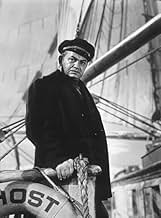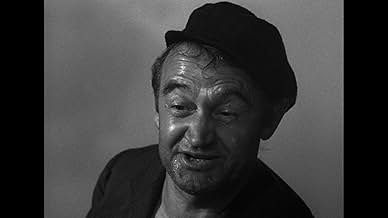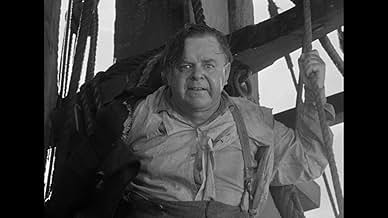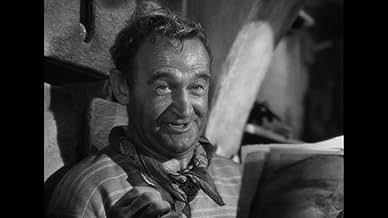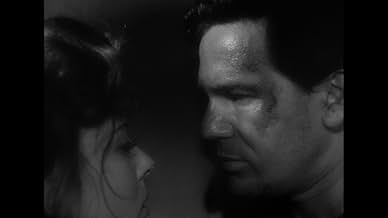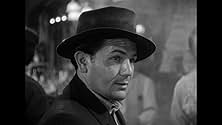IMDb RATING
7.5/10
4.8K
YOUR RATING
After being fished out of the sea by a sailing ship, three fugitives find themselves prisoners of the ship's brutal skipper who refuses to put them ashore, and they hatch an escape plan duri... Read allAfter being fished out of the sea by a sailing ship, three fugitives find themselves prisoners of the ship's brutal skipper who refuses to put them ashore, and they hatch an escape plan during a crew mutiny.After being fished out of the sea by a sailing ship, three fugitives find themselves prisoners of the ship's brutal skipper who refuses to put them ashore, and they hatch an escape plan during a crew mutiny.
- Nominated for 1 Oscar
- 2 nominations total
Ernie Adams
- Pickpocket
- (uncredited)
Cliff Clark
- First Detective
- (uncredited)
Jeane Cowan
- Singer
- (uncredited)
Richard Cramer
- Bartender
- (uncredited)
William Gould
- Second Detective
- (uncredited)
Ralf Harolde
- Agent Getting Johnson Shanghaied
- (uncredited)
Oscar 'Dutch' Hendrian
- Crewman
- (uncredited)
- Director
- Writers
- All cast & crew
- Production, box office & more at IMDbPro
Featured reviews
Jack London's novel "The Sea Wolf" is one of those old chestnuts that seemingly won't go away. It has served as an subject for movies almost since they began being made, including Italian and Russian versions. This 1941 Warner version remains the definitive screen adaptation, however, in spite of numerous alterations to the plot of the original novel.
In the book, Wolf Larson is a giant Norwegian sea captain who rules his ship by virtue of his strength and brutality. He is the embodiment of the old joke which runs: "Yea though I walk through the valley of the shadow of death I shall fear no evil, because I am the meanest, toughest son of a b--- in the valley!" One would ordinarily think that the five foot six inches tall Edward G. Robinson would be a poor choice to play such a character. However, Robinson is a good enough actor, and a forceful enough screen personality, to carry it off.
John Garfield is equally perfect as a chip-on-the-shoulder working class seaman who dares to oppose Larson. He's a perfect foil for Robinson, and it's great fun watching the two of them snarl at each other like a couple of wild dogs.
Ida Lupino and Alexander Knox do some of their best work as the two castaways rescued by Larson's vessel. Lupino plays a female ex-convict trying to conceal her past, and Knox is an effete writer whom Larson decides to educate in what he considers the ways of the real world.
Gene Lockhart and Barry Fitzgerald are equally good in supporting roles as the ship's drunken and degraded doctor, and the thoroughly corrupt cook. It is particularly refreshing to see Fitzgerald play a really unpleasant character for a change, and one can only wonder why he didn't get more parts like this. In The Sea Wolf, Fitzgerald plays an individual so slimy that one almost expects to see him leave a trail behind him, like a slug.
Director Michael Curtiz managed to impart a dank and foggy atmosphere to The Sea Wolf that seems to suit the story perfectly, and that feeling is enhanced by Erich Korngold's moody score. The first view of the schooner "Ghost", looming out of the fog like a real ghost, is particularly memorable.
Granted, the ending differs radically from that of the book. This film's ending seems rather more satisfying than London's was, however. London was virtually forced to end the novel the way he did because it is presented in narrative form and the writer, Van Wyden, is the one actually telling the story. Warner Brothers could change the ending because, as a movie, the story was no longer restricted to Van Wyden's point of view.
In the book, Wolf Larson is a giant Norwegian sea captain who rules his ship by virtue of his strength and brutality. He is the embodiment of the old joke which runs: "Yea though I walk through the valley of the shadow of death I shall fear no evil, because I am the meanest, toughest son of a b--- in the valley!" One would ordinarily think that the five foot six inches tall Edward G. Robinson would be a poor choice to play such a character. However, Robinson is a good enough actor, and a forceful enough screen personality, to carry it off.
John Garfield is equally perfect as a chip-on-the-shoulder working class seaman who dares to oppose Larson. He's a perfect foil for Robinson, and it's great fun watching the two of them snarl at each other like a couple of wild dogs.
Ida Lupino and Alexander Knox do some of their best work as the two castaways rescued by Larson's vessel. Lupino plays a female ex-convict trying to conceal her past, and Knox is an effete writer whom Larson decides to educate in what he considers the ways of the real world.
Gene Lockhart and Barry Fitzgerald are equally good in supporting roles as the ship's drunken and degraded doctor, and the thoroughly corrupt cook. It is particularly refreshing to see Fitzgerald play a really unpleasant character for a change, and one can only wonder why he didn't get more parts like this. In The Sea Wolf, Fitzgerald plays an individual so slimy that one almost expects to see him leave a trail behind him, like a slug.
Director Michael Curtiz managed to impart a dank and foggy atmosphere to The Sea Wolf that seems to suit the story perfectly, and that feeling is enhanced by Erich Korngold's moody score. The first view of the schooner "Ghost", looming out of the fog like a real ghost, is particularly memorable.
Granted, the ending differs radically from that of the book. This film's ending seems rather more satisfying than London's was, however. London was virtually forced to end the novel the way he did because it is presented in narrative form and the writer, Van Wyden, is the one actually telling the story. Warner Brothers could change the ending because, as a movie, the story was no longer restricted to Van Wyden's point of view.
One of the great classics Directed by the gifted tyrant Micheal Curtiz. Every performance is excellent with Edward G. giving one of his best. Curtiz did not make boring films, this speeds along at under 90 minutes without a dull moment. The miniature work is even good, note the scene near the beginning with the row boat in the bay. That is a miniature in a tank but pretty damn convincing. Flawless and gripping.
Edward G. Robinson puts his own brand of cruelty on the role of a freighter captain who tyrannizes his crew and some unexpected passengers (Ida Lupino, John Garfield, Alexander Knox) in this taut, suspenseful psychological melodrama with no shortage of brooding atmosphere.
Based on the famous Jack London story of Wolf Larsen (Robinson), the callous and inhuman skipper of a schooner, who proceeds to make life hell for his crew and his unwilling passengers rescued from a sinking ferryboat. Lupino and Garfield are a couple of losers with a past; Knox is a mild-mannered novelist. The romantic angle between Garfield and Ida is underplayed with the accent more on the brooding tension aboard the schooner.
Under Michael Curtiz' direction, all the performances are first-rate and Erich Wolfgang Korngold's intriguing score helps sustain the tense mood of passengers adrift on a fog-shrouded sea. Alexander Knox's restrained portrayal of an intellectual is a perfect foil for Robinson's bombastic megalomaniac skipper. Stand-outs in the large supporting cast are Gene Lockhart as a nervous, cowardly doctor and Barry Fitzgerald as a crafty cook, a sinister departure from his usual comic roles.
Absorbing all the way, well worth viewing, this represented a step up the ladder for Ida Lupino's career at Warner Bros. Watch for my full-length career article on Ida Lupino scheduled to appear in an upcoming issue of FILMS OF THE GOLDEN AGE.
Based on the famous Jack London story of Wolf Larsen (Robinson), the callous and inhuman skipper of a schooner, who proceeds to make life hell for his crew and his unwilling passengers rescued from a sinking ferryboat. Lupino and Garfield are a couple of losers with a past; Knox is a mild-mannered novelist. The romantic angle between Garfield and Ida is underplayed with the accent more on the brooding tension aboard the schooner.
Under Michael Curtiz' direction, all the performances are first-rate and Erich Wolfgang Korngold's intriguing score helps sustain the tense mood of passengers adrift on a fog-shrouded sea. Alexander Knox's restrained portrayal of an intellectual is a perfect foil for Robinson's bombastic megalomaniac skipper. Stand-outs in the large supporting cast are Gene Lockhart as a nervous, cowardly doctor and Barry Fitzgerald as a crafty cook, a sinister departure from his usual comic roles.
Absorbing all the way, well worth viewing, this represented a step up the ladder for Ida Lupino's career at Warner Bros. Watch for my full-length career article on Ida Lupino scheduled to appear in an upcoming issue of FILMS OF THE GOLDEN AGE.
It's amazing what a really good actor can pull off. In the Jack London novel on which this film was loosely based, Wolf Larson is tall, blond, Scandinavian, an "ubermensch" flaunting his invincible strength and power over other men. Edward G. Robinson was very short and dark, almost gnome-like with little stubby hands, a homely face and nasal voice. Yet somehow he fills this improbable role, making Larson at once larger than life and credibly human.
Larson is, of course, the "sea wolf" of the title, captain of the Ghost, a mysterious, perpetually fog-enshrouded schooner. Manned by a crew of brutal and brutalized men, the ship is ostensibly hunting seals, but its real destination is a show-down with Wolf's brother, the even more colorfully named Death Larson. We never learn much about this sibling feud, or about the backgrounds of the major characters. Aside from Larson, there is George Leach (John Garfield), who signs on with the ship to escape a prison rap, and two passengers rescued from the wreck of a ferry in San Francisco harbor: Ruth (Ida Lupino), an escaped convict, and Van Weyden, a well-bred writer who becomes, as observer and interpreter of the action, the film's central consciousness. Larson refuses to put the two castaways ashore, seemingly out of pure spite. Leach plots to escape the ship, and the threat of mutiny hangs in the air.
As this summary suggests, the movie's plot is as foggy as its atmosphere, but this doesn't matter very much. The atmosphere, at once raffish and eerie, and the beautifully drawn characters provide plenty of interest, and there is also a serious and compelling theme. Larson's motto (from Milton) is "better to reign in hell than serve in heaven." Van Weyden, who becomes the secretly intellectual captain's confidant, realizes that Larson is afraid to leave his ship because only as its captain can he enjoy absolute power; on shore he would be forced to compete with his equals and betters. His sport is humiliating his victims and stripping them of dignity and self-respect. He gratuitously insults and torments all those who attempt to challenge him: in addition to Leach and Ruth, there is Louis (the excellent Gene Lockhart), a broken, alcoholic doctor who tries to recover his dignity after saving Ruth's life with a transfusion of Leach's blood. Larson won't let him, of course, and his desperate response prompts the writer's comment, "There is a price no man will pay for living." Larson even turns against Cookie (Barry Fitzgerald), his most loyal crew-member. Fitzgerald is spectacularly loathsome, shrieking with laughter and scuttling around his galley like a demonic leprechaun.
John Garfield, to his credit, was never reluctant to take supporting roles in films he admired. His part here, while secondary, is a pip: a defiant young roughneck, smarting with wounded pride, looking terrific in a tattered sweater and fisherman's cap. He gets a great introduction in the first scene, walking into a waterfront dive where he brushes off a pickpocket ("If you find anything in there, brother, I'll share it with you") and knocks out the recruiter who tries to slip him a mickey. On board the Ghost, he's the only one of the sailors who rebels against Larson; when ordered to address the captain with respect, he manages to make "sir" sound like a four-letter word. "Don't worry," he says before the transfusion, "This kind of blood never cools off."
Ida Lupino is wonderful (when was she not?) as the convict who has lost her spirit; her pathetic lady-like act keeps giving way to flashes of anger and underlying sadness. She and Garfield make a perfect couple, and their romance, which could have seemed like a sop to the box office, is deeply touching. Like Garfield, Lupino regularly played tough, resentful hard-luck kids. But her pale, waif-like delicacy and wistfulness contrast nicely with Garfield's rough-hewn sturdiness and combustible temper. They have three good scenes together: one where she finds him huddled like a whipped puppy in the ship's hold (he has been beaten after assaulting the captain) and they smoke cigarettes together. Initially hostilehe tells her scornfully that he only stood up for her because "I can't even stand to see a dog beg, much less a human being"they quickly bond. He urges her to keep fighting and boasts that Larson can never break his spirit, while she wearily responds that nothing makes any difference to her anymore. Later they talk in a doorway, Ida in her nightgown, and he touches her arm, realizing that his own blood is running through it. They don't kiss, but their chemistry is palpable. Finally they play a love scene on either side of a locked iron door, whispering to each other with their lips touching the wall between them.
Eventually Larson's invincibility starts to crack, as he suffers from crippling migraines and hysterical blindness. He remains too vicious to arouse any pity, but Robinson makes him a fascinating monster. He conveys such a dominant, overpowering will that you hardly notice he's not physically imposing; his sneering voice, nasty laugh and devious intelligence make him genuinely scary. The intense performances of the whole cast knit together this unusual blend of boy's-adventure-story entertainment and serious drama, a classic of the Warner Brothers' minor-key style.
Larson is, of course, the "sea wolf" of the title, captain of the Ghost, a mysterious, perpetually fog-enshrouded schooner. Manned by a crew of brutal and brutalized men, the ship is ostensibly hunting seals, but its real destination is a show-down with Wolf's brother, the even more colorfully named Death Larson. We never learn much about this sibling feud, or about the backgrounds of the major characters. Aside from Larson, there is George Leach (John Garfield), who signs on with the ship to escape a prison rap, and two passengers rescued from the wreck of a ferry in San Francisco harbor: Ruth (Ida Lupino), an escaped convict, and Van Weyden, a well-bred writer who becomes, as observer and interpreter of the action, the film's central consciousness. Larson refuses to put the two castaways ashore, seemingly out of pure spite. Leach plots to escape the ship, and the threat of mutiny hangs in the air.
As this summary suggests, the movie's plot is as foggy as its atmosphere, but this doesn't matter very much. The atmosphere, at once raffish and eerie, and the beautifully drawn characters provide plenty of interest, and there is also a serious and compelling theme. Larson's motto (from Milton) is "better to reign in hell than serve in heaven." Van Weyden, who becomes the secretly intellectual captain's confidant, realizes that Larson is afraid to leave his ship because only as its captain can he enjoy absolute power; on shore he would be forced to compete with his equals and betters. His sport is humiliating his victims and stripping them of dignity and self-respect. He gratuitously insults and torments all those who attempt to challenge him: in addition to Leach and Ruth, there is Louis (the excellent Gene Lockhart), a broken, alcoholic doctor who tries to recover his dignity after saving Ruth's life with a transfusion of Leach's blood. Larson won't let him, of course, and his desperate response prompts the writer's comment, "There is a price no man will pay for living." Larson even turns against Cookie (Barry Fitzgerald), his most loyal crew-member. Fitzgerald is spectacularly loathsome, shrieking with laughter and scuttling around his galley like a demonic leprechaun.
John Garfield, to his credit, was never reluctant to take supporting roles in films he admired. His part here, while secondary, is a pip: a defiant young roughneck, smarting with wounded pride, looking terrific in a tattered sweater and fisherman's cap. He gets a great introduction in the first scene, walking into a waterfront dive where he brushes off a pickpocket ("If you find anything in there, brother, I'll share it with you") and knocks out the recruiter who tries to slip him a mickey. On board the Ghost, he's the only one of the sailors who rebels against Larson; when ordered to address the captain with respect, he manages to make "sir" sound like a four-letter word. "Don't worry," he says before the transfusion, "This kind of blood never cools off."
Ida Lupino is wonderful (when was she not?) as the convict who has lost her spirit; her pathetic lady-like act keeps giving way to flashes of anger and underlying sadness. She and Garfield make a perfect couple, and their romance, which could have seemed like a sop to the box office, is deeply touching. Like Garfield, Lupino regularly played tough, resentful hard-luck kids. But her pale, waif-like delicacy and wistfulness contrast nicely with Garfield's rough-hewn sturdiness and combustible temper. They have three good scenes together: one where she finds him huddled like a whipped puppy in the ship's hold (he has been beaten after assaulting the captain) and they smoke cigarettes together. Initially hostilehe tells her scornfully that he only stood up for her because "I can't even stand to see a dog beg, much less a human being"they quickly bond. He urges her to keep fighting and boasts that Larson can never break his spirit, while she wearily responds that nothing makes any difference to her anymore. Later they talk in a doorway, Ida in her nightgown, and he touches her arm, realizing that his own blood is running through it. They don't kiss, but their chemistry is palpable. Finally they play a love scene on either side of a locked iron door, whispering to each other with their lips touching the wall between them.
Eventually Larson's invincibility starts to crack, as he suffers from crippling migraines and hysterical blindness. He remains too vicious to arouse any pity, but Robinson makes him a fascinating monster. He conveys such a dominant, overpowering will that you hardly notice he's not physically imposing; his sneering voice, nasty laugh and devious intelligence make him genuinely scary. The intense performances of the whole cast knit together this unusual blend of boy's-adventure-story entertainment and serious drama, a classic of the Warner Brothers' minor-key style.
The London classic has been filmed many times, but never better than here. It's Warner Bros. operating on all 8 cylinders, from casting, to directing, to art department and special effects. So who better to play the maniacal captain than Edward G, Robinson at his snarling prime, or the rebellious ex-con than John Garfield at his defiant prime, or the downtrodden girl than Ida Lupino at her soulful prime. Together they're a dynamite cast, and even the snobbish Alexander Knox manages his literary role in fairly sympathetic fashion. It's atmospheric the whole way with the aptly named Ghost slipping through one fog bank after another.
The Robert Rossen adaptation is less philosophical than others. Robinson's Wolf Larson acts more out of psychological compulsion than philosophical principle. His battle of wits with Knox's Humphrey van Weyden is more about Freudian ego than the merits of a Nietschean superman. Larson desires power to prove his own self and not to prove a larger point about ruthlessness and the struggle to survive. I suspect that had the movie been made a few years later, Hitlerian comparisons would have been drawn. Then too, when there's talk of the ship's "downtrodden" crew being freed at last, it's likely the leftish Rossen has more than a ship's crew in mind. Too bad that the commanding Howard deSilva doesn't have a larger role which would have made the outlaw ship even more hellish.
Note the informal wedding vows exchanged between Lupino and Garfield at movie's end. The lines are rather clumsy and out-of-step with the rest of the script. I suspect the censors required some such vows before the couple were allowed to live together on a deserted island after leaving the ship. Even though this seems a reach, I gather censorship concerns could indeed reach to such an implied level. Be that as it may, the Robinson performance is powerfully riveting and not to be missed. All in all, the movie remains a fine example of ensemble film-making and a tribute to Hollywood's old studio system.
The Robert Rossen adaptation is less philosophical than others. Robinson's Wolf Larson acts more out of psychological compulsion than philosophical principle. His battle of wits with Knox's Humphrey van Weyden is more about Freudian ego than the merits of a Nietschean superman. Larson desires power to prove his own self and not to prove a larger point about ruthlessness and the struggle to survive. I suspect that had the movie been made a few years later, Hitlerian comparisons would have been drawn. Then too, when there's talk of the ship's "downtrodden" crew being freed at last, it's likely the leftish Rossen has more than a ship's crew in mind. Too bad that the commanding Howard deSilva doesn't have a larger role which would have made the outlaw ship even more hellish.
Note the informal wedding vows exchanged between Lupino and Garfield at movie's end. The lines are rather clumsy and out-of-step with the rest of the script. I suspect the censors required some such vows before the couple were allowed to live together on a deserted island after leaving the ship. Even though this seems a reach, I gather censorship concerns could indeed reach to such an implied level. Be that as it may, the Robinson performance is powerfully riveting and not to be missed. All in all, the movie remains a fine example of ensemble film-making and a tribute to Hollywood's old studio system.
Did you know
- TriviaThe first movie to have its world premiere on a ship: the luxury liner "America", during a trip from San Francisco to Los Angeles.
- GoofsUntil the era of the 1st World War, the practice on board a ship was to call orders for the helmsman to move the tiller either to port or to starboard. Calling "hard a-port" meant moving the tiller to port, which means the rudder and the vessel, will then move to starboard. With wheel steering, putting the helm/tiller to port, means spinning the wheel to starboard. Ships no longer use this system - these days helm directions refer to the desired turn of the rudder/vessel. The James Cameron movie "Titanic" also contained a similar scene, which generated a lot of puzzlement. It IS a bit confusing at first, unless one is a sailor and is familiar with tiller steering.
- Quotes
Humphrey Van Weyden: There's a price no man will pay for living.
- Alternate versionsThe film was cut by approximately 12 minutes down to less than 90 minutes for re-issue. The deleted footage consisted of little, but integral, moments throughout the story which added considerably to the quality of the film as a whole. For many years, the only known existing print of the original 99-minute theatrical version was a 16mm print which belonged to the film's star, John Garfield. However, Warner Brothers studio recently discovered a 35mm print of this original version at the Museum of Modern Art in New York City. It was subsequently restored and used for distribution on DVD and Blu Ray.
- ConnectionsEdited into Le loup de mer (1993)
- SoundtracksHello! Ma Baby
(uncredited)
Music by Joseph E. Howard
Lyrics by Ida Emerson
Played on piano and sung by Jeane Cowan in the bar
Details
Box office
- Budget
- $1,013,217 (estimated)
- Gross worldwide
- $6,192
- Runtime1 hour 40 minutes
- Color
- Aspect ratio
- 1.37 : 1
Contribute to this page
Suggest an edit or add missing content



